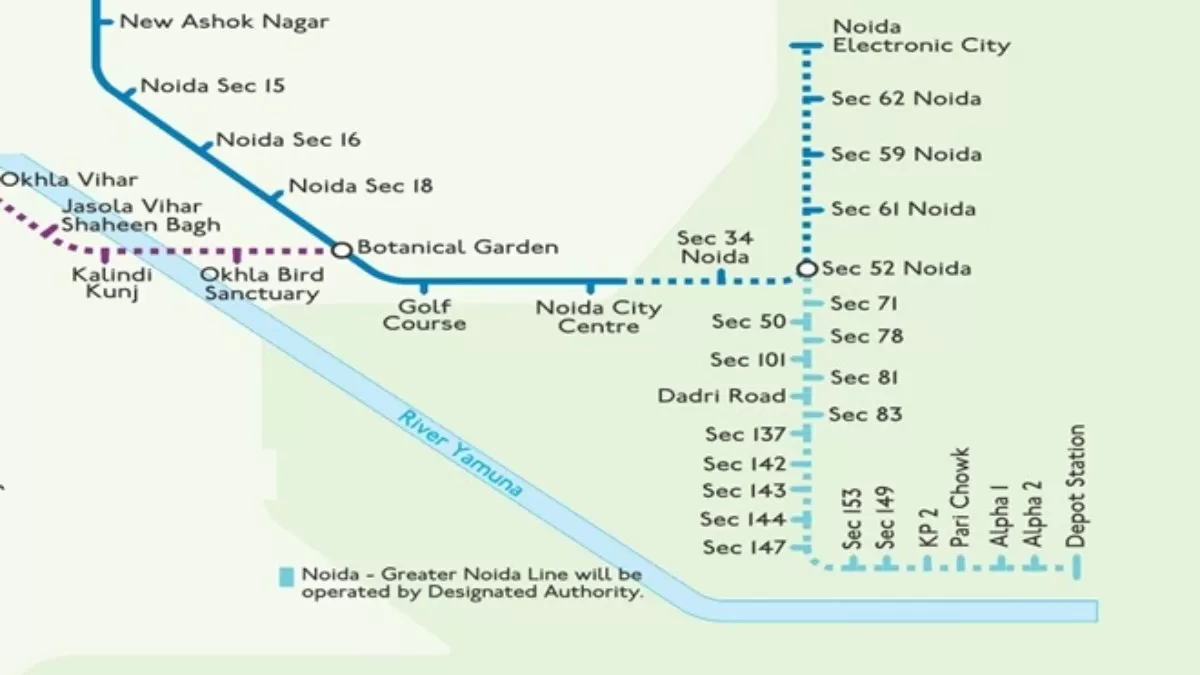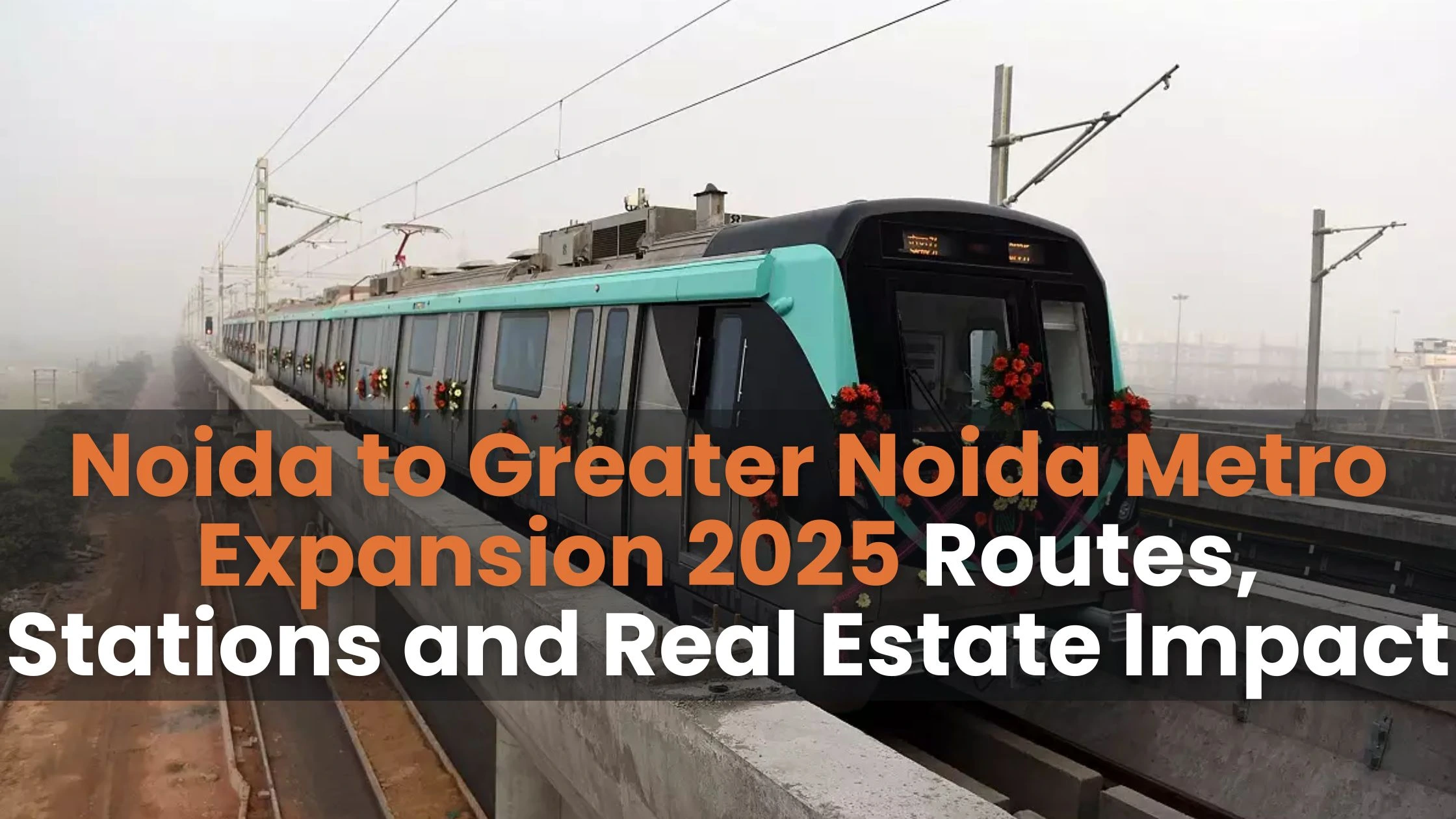Table of Content
▲
The Noida to Greater Noida Metro Expansion is part of an ambitious plan to improve connectivity between two crucial cities in the NCR. Spanning approximately 11.56 km, this new corridor will link Noida with Greater Noida, providing a rapid transit solution that promises to reduce traffic congestion and shorten travel times. With an expected start of construction within three months of the announcement, the project is poised to deliver significant benefits for commuters, residents, and investors alike.
Why This Expansion Matters
- Enhanced Connectivity:
The new metro link will connect key residential, commercial, and industrial zones, offering a seamless travel experience for daily commuters. Improved connectivity is essential to manage the increasing urban sprawl and reduce the heavy reliance on private vehicles. - Economic Boost:
Efficient public transport not only improves the quality of life for residents but also stimulates economic activity. With better accessibility, businesses in both Noida and Greater Noida can expect a surge in customer footfall and higher employee productivity. - Urban Renewal:
The expansion is set to trigger urban renewal along its corridor. As connectivity improves, older neighborhoods will undergo transformation, attracting new investments and increasing property values.
Also Read: Gurgaon Metro 2025: Routes, Stations, and Real Estate Impact
Route Details and Key Stations

A critical component of the metro expansion is its carefully planned route, which includes several strategically located stations designed to serve high-demand areas. The new metro link begins at Noida and extends into Greater Noida, ensuring that both established and emerging areas benefit from improved transit.
Proposed Route and Station Highlights
|
Station Name |
Area/Significance |
|
Sector 51, Noida (Existing) |
Starting point; major residential & commercial hub |
|
Sector 61, Noida |
Planned interchange with other metro lines |
|
Sector 70, Noida |
Key residential zone |
|
Sector 122, Noida |
Emerging area with growing infrastructure |
|
Sector 123, Noida |
Residential and commercial mix |
|
Greater Noida Sector 4 |
Entry point into Greater Noida |
|
Eco Tech-12 |
Zone earmarked for sustainable development |
|
Greater Noida Sector 2 |
Residential cluster with planned amenities |
|
Greater Noida Sector 3 |
Upcoming residential and business area |
|
Greater Noida Sector 10 |
Well-connected zone for mixed-use developments |
|
Greater Noida Sector 12 |
Growing residential area |
|
Knowledge Park V |
Final station; major commercial and IT hub |
Project Timeline
Timelines provide clarity for both investors and commuters. According to the latest reports:
- Construction Start:
Work on the 11.56 km metro link is expected to commence within three months of the official announcement. - Completion and Inauguration:
Although exact dates may vary, experts project that the expanded metro network will be operational by 2027–2028, subject to timely clearances and efficient project execution.
This timeline gives stakeholders a clear window of when to expect enhanced connectivity and the associated economic benefits.
Real Estate Impact
The Noida to Greater Noida Metro Expansion is poised to have a profound impact on the local real estate market. Here’s how:
- Boost in Property Values
Enhanced connectivity generally leads to increased property values. As metro stations become operational, areas in close proximity are expected to experience a surge in demand. Improved accessibility often translates to higher rental yields and greater returns on investment.
- Increased Residential and Commercial Development
The availability of efficient public transport makes previously underdeveloped areas more attractive for new residential and commercial projects. Developers are likely to launch new housing schemes and office complexes along the metro corridor, contributing to urban renewal and economic growth.
- Attraction of Investors
A robust metro network reduces commuting time and increases the desirability of a location. Investors are likely to take advantage of the anticipated rise in property values, leading to a more vibrant and dynamic real estate market.
- Enhanced Quality of Life
For residents, the metro expansion promises shorter commutes, reduced traffic congestion, and a better overall quality of life. Access to reliable public transport also means increased access to essential services, such as education and healthcare, which further enhances urban living.
Broader Benefits for the Region
Beyond immediate real estate gains, the metro expansion has broader economic and social benefits:
- Economic Growth:
Improved connectivity drives business activities, boosts employment, and attracts investments. A thriving real estate market contributes significantly to the region’s GDP and overall economic health. - Urban Renewal:
The development of new infrastructure often leads to the revitalization of older neighborhoods. This urban renewal can transform the cityscape, making it more modern and sustainable. - Environmental Impact:
With more people opting for public transport, the reliance on private vehicles decreases. This leads to reduced traffic congestion and lower carbon emissions, contributing to a greener, more sustainable urban environment.
Conclusion
The Noida to Greater Noida Metro Expansion is set to be a game-changer for the NCR region. With a well-planned route, strategically located stations, and a clear timeline for construction and completion, the project is poised to significantly enhance urban connectivity. The benefits extend beyond improved commuting—this metro link is expected to boost property values, drive new residential and commercial developments, and stimulate overall economic growth.
For homebuyers, investors, and urban planners, this expansion represents an exciting opportunity to be part of a transformative project that will reshape the urban landscape. By staying informed about the progress and understanding the potential impact, stakeholders can better position themselves to take advantage of the benefits that a modern, efficient metro system brings to the region.
Embrace the change as Noida and Greater Noida become more interconnected, paving the way for a brighter, more prosperous future in the heart of the NCR.
Also Read: Mumbai Metro 2025: Enhanced Routes, Stations & Real Estate Impact






_1771582392.webp)
_1771577585.webp)
Ans 1. The expansion covers approximately 11.56 km, connecting key areas in Noida and Greater Noida.
Ans 2. Construction is expected to start within three months of the official announcement.
Ans 3. The project is projected to be operational by 2027–2028, subject to timely approvals and execution.
Ans 4. The route will connect key stations such as Sector 51, Sector 61, and Knowledge Park V, along with emerging areas like Sector 123 and Eco Tech-12.
Ans 5. The expansion is likely to boost property values, increase demand for residential and commercial spaces, and attract investments in areas near metro stations.
Ans 6. Improved connectivity will stimulate business activities, enhance employee productivity, and attract more investments in the NCR region.
Ans 7. Knowledge Park V is a major commercial and IT hub, expected to benefit greatly from enhanced metro connectivity.
Ans 8. Yes, the metro aims to offer a reliable public transit option, encouraging people to reduce their dependence on private vehicles.
Ans 9. The expansion promises shorter commutes, better connectivity, and easier access to essential services, improving the overall quality of urban living.
Ans 10. The project is expected to lower carbon emissions and reduce traffic congestion by encouraging the use of public transport, contributing to a greener NCR.